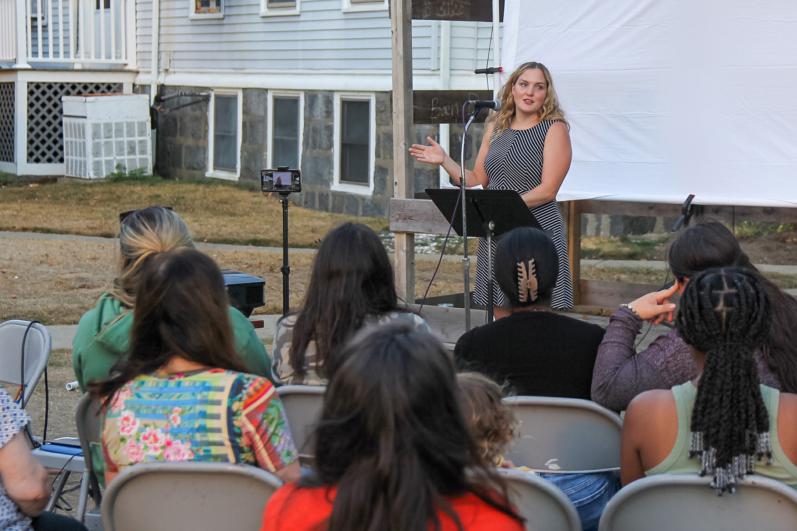Quincy collaborative hosts 'mental health night'
QUINCY -- On Aug. 18, the St. John the Baptist-St. Joseph Parish Collaborative hosted the first of what they hope will be a series of "mental health nights," starting with a keynote speaker and a movie about processing emotions during periods of transition.
Chairs were set up on the lawn outside St. John the Baptist Church in front of a screen and a podium, where about 30 parishioners, including many students, heard a talk on "Coping with Christ Through Transitions."
The keynote speaker was Genevieve Nave, LMHC, a practicing psychotherapist and the founder of the Center for Therapy and Healing. After Nave's talk, which was also live-streamed on the pastor Father Matt Williams' YouTube channel, they watched "Inside Out," a Disney Pixar movie about a girl named Riley who experiences new and complicated emotions when her family moves to a different state. Personifications of her emotions, Joy and Sadness, must go on a journey through her mind in order to restore her emotional balance and peace.
Nave's talk focused on the stress of transitions, such as moving, changing jobs, returning to school, or starting or ending a relationship. She also spoke about the mental health benefits of spirituality, something that even secular research attests to, and how her Catholic faith informs her work.
"I know that all of the coping skills that we research and tell people about, you can find here. So I really think God is the answer, and sometimes I can't always say that at work, but I think it's a great opportunity to be able to say it here," Nave told The Pilot prior to the event.
In her remarks, she defined stress as "a physical and emotional tension."
"When we're stressed, we're not our best," she said.
She asked everyone to think of their best and truest self. She said that as a Catholic, she thinks of this as when she is most connected to God. In her professional world, she calls it one's "optimal window of arousal," a state of calmness and clarity that is neither "too high" nor "too low" in energy and emotion. Nave said her job as a therapist is to help people return to "that happy place."
"That's what my training has taught me to do, but it's my Catholic faith that reassures me that it's not only possible, but that resilience and that ability to come back to the center is a fundamental part of who we are and how we're made," Nave said.
She quoted St. John Paul II, who believed that people are "made for happiness." She said that Christ has the answer to this desire.
"Resilience doesn't mean that I'm never stressed or that transitions don't faze me, but resilience does mean that I can face life's challenges and be okay, because I have a way back into that optimal window of arousal," Nave said.
She pointed out that Jesus and his disciples experienced periods of transition, such as when the Holy Family became refugees in Egypt, and when the apostles were "uprooted" after his death. Referencing Jesus' words to his disciples at the Last Supper, when he called himself "the Way," Nave called Jesus "our forever home."
"Even when we move, even when there's transition, he's our constant, and he's the stability that we crave," Nave said.
She said that even in secular discussions of psychology, spirituality is a "protective factor" and a recognized source of mental health benefits, bringing hope and a sense of community that can increase people's resilience.
Nave named four steps to build resilience: noticing one's triggers; noticing the physical and mental impact of triggers; picking coping skills directly related to those symptoms; and, finally, noticing how one feels afterwards and whether the coping skill was effective. Nave said these steps can be repeated as many times as needed.
Nave spoke about the importance of gratitude, which is not only a Christian value but has also been shown by research to be "hugely beneficial." She said prayer can help to cultivate gratitude, and that it is neurologically impossible to experience gratitude and negative emotions at the same time.
Finally, Nave emphasized that community is one of the best factors of strong resilience.
"If I only have one message tonight, it's that you don't have to deal with anything you're going through alone. Please talk to somebody. Please get some help," she said.
At the end of her talk, Nave took questions from audience members, some of whom role-played to describe scenarios in which people might feel stress or anxiety.
Francesca Alberti, the parish youth minister who organized the event, distributed handouts with a list of mental health resources, including Nave's practice, Catholic therapists, and emergency helplines.
Alberti told the attendees that they want to hold more mental health events, and invited feedback as they make their plans.
"This is up to you, this is [about] what you need, it's not about what we want. We just want to be helpful to you and want to extend a hand and walk with you through this," she told them.
Alberti is studying theology and catechetics at Franciscan University of Steubenville and is planning to pursue her master's degree in psychology next year. Speaking to The Pilot after the movie, Alberti said they hope to hold a question-and-answer session with teenagers and parents, as well as a small group, separate from existing programs like the youth group and bereavement group. She said her own goal is to become a therapist in affiliation with the parish, and she expressed the hope that every parish could have a therapist.
"Depression and anxiety is so high after COVID, we need this in the world," she said.



















